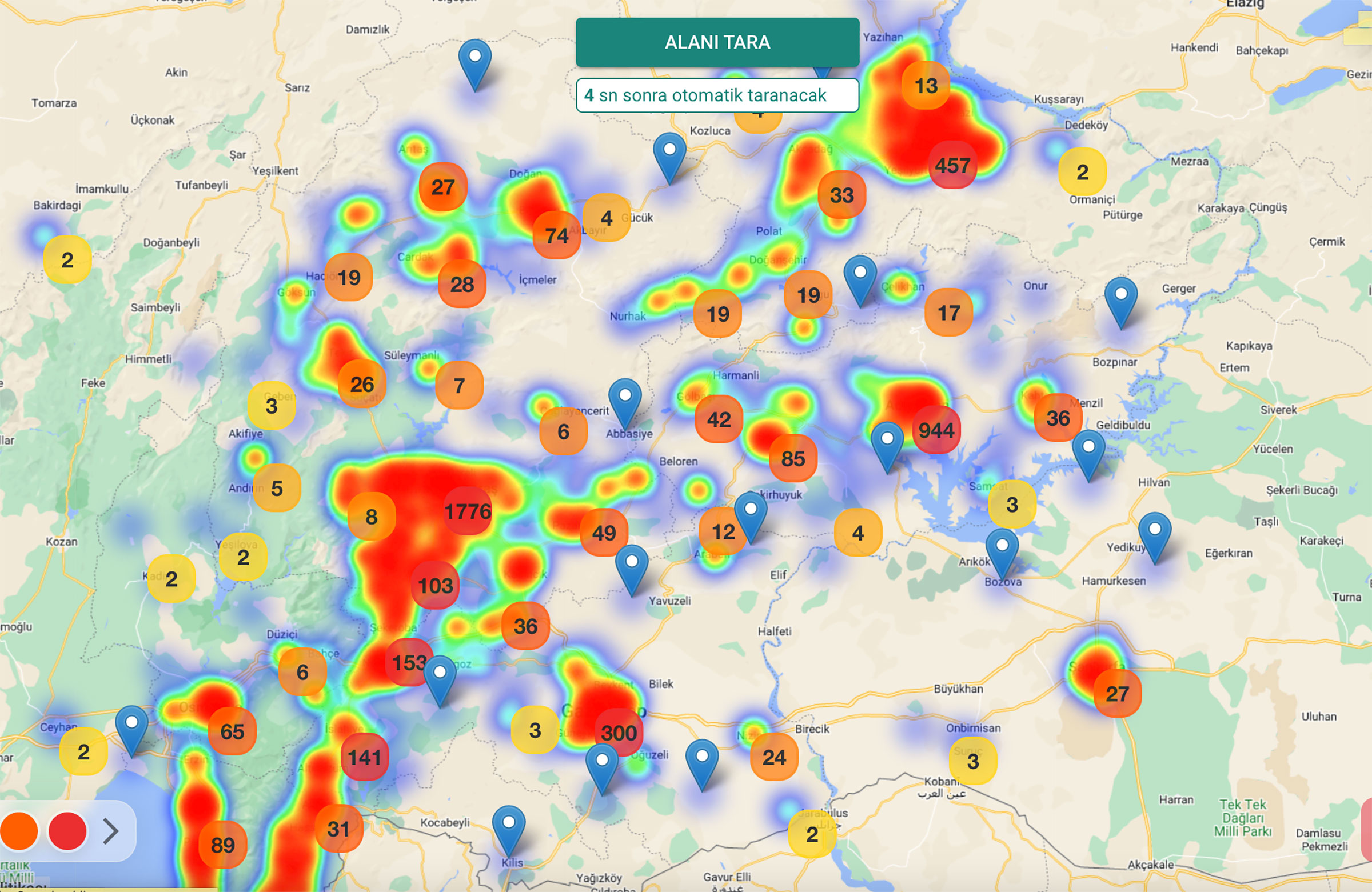For the past four days, Hakan Özalp’s Twitter feed has been an endless stream of tragedy. From his home in Amsterdam, the Turkish business professor keeps scrolling through names, phone numbers, and addresses identifying where people are trapped in the debris from a 7.8 magnitude earthquake that devastated parts of his home country on Monday, killing at least 20,000 people in southern Turkey and neighboring Syria. “It’s hard not to despair,” Özalp says.
Özalp is one of many who leapt into action from afar in the wake of the quake and its aftershocks. Within hours, a group of thousands of developers and analysts from Turkey’s tech community, aided by volunteers from across the globe, had come together to scrape social data that might guide rescue workers. The effort, which had grown to 22,000 people by Friday, collected tweets through location-tagging and hashtags, fixed any errors, and created a heat map showing where the calls for help from survivors were concentrated. The final data was then shared with rescue crews in the field and organizations scrambling to provide aid.
Social media data, especially from Twitter, has long been an invaluable tool in the wake of natural disasters. But this time, according to four data scientists and researchers involved in the rescue effort, the work has been hampered by recent changes to Twitter’s API, the programming interface that enables third parties to access and analyze public data on the platform. Since Elon Musk acquired Twitter in October and restructured the company, laying off almost 80% of its staff, data streaming has slowed down and problems with the mechanisms that allow programmers, academics, journalists and NGOs to collect public data have intensified, they say. Twitter’s portals that connected developers to the company’s engineering teams have also gone inactive, severing another important link.

Twitter’s sudden announcement on Feb. 2 that it would end free access to its API in a week—a deadline that has been extended to Feb. 13—is likely to further impact the coordination of vital relief efforts in the affected areas, say the data scientists and researchers involved with the rescue effort. This has left hundreds of volunteers frantically trying to contact the company—and Musk himself—in search of clarity. (Twitter did not respond to TIME’s request for comment.)
Twitter’s critical role in disaster relief was underlined Wednesday when the Turkish government restricted access to the platform for roughly 12 hours. The move by President Tayyip Erdogan’s government throttled aid coordination and rescue operations, according to opposition activists and aid groups. “Blocking Twitter at a time like this is murder,” tweeted Sera Kadigil, a member of the Turkish Labour Party. The issue was further exacerbated when Twitter itself experienced widespread outages Wednesday, which reportedly came as the platform experimented with allowing longer posts for paid users.
“Twitter is crucial during such disasters,” says Eser Özvataf, a developer and consultant who is one of the leaders of the “Earthquake Help” project. “Maybe it depends on the culture, but in Turkey, text-based social media communications are mostly on Twitter.” As of Friday, the project had delivered more than 45,000 unique AI-refined entries calling for help to rescue crews and NGOs, he says.
The scale of the devastation and the logistical challenges it presents have emphasized how important Twitter has become in the aftermath of natural disasters and humanitarian crises. “Tweets are used for calling for all kinds of help,” says Sedat Kapanoglu, a former software engineer at Microsoft and co-founder of Turkish social platform Ekşi Sözlük who is working on the effort. While the search for survivors is turning to recovery and aid relief, coordination will become no less important in the coming weeks as rescuers work in the bitter cold.
Tech volunteers in Turkey say it’s not clear whether they’ll be able to continue relying on Twitter’s data going forward. “If the API stops, the flow of data will stop and people will have to rely solely on slower ways of coordination for the relief efforts,” says Kapanoglu. “That can have life-altering effects. It’s that important.”
There’s no easy way to fill the void, either. When it comes to collecting social data during a crisis and amplifying calls for help, Twitter is unmatched. It’s so quick and accurate in disaster situations that the U.S. Geological Survey began relying on the platform in 2015 to track and detect earthquakes in areas where it doesn’t have high-speed sensors. Twitter was especially well-suited to collect this data in a country like Turkey, which ranks seventh in the world for users, and where almost one in four people over the age of 13 uses the platform, based on company data released last year.

“People under the rubble called for help by sending tweets. Others retweeted them,” says Kapanoglu. “We have a tremendous amount of data there, and the API is the most reliable and the safest way to access that data continuously.”
But the tools Twitter uses to provide public access to its data have been breaking down since Musk’s acquisition of Twitter last fall, and the mass exodus of engineers who regularly updated them has exacerbated existing issues, data scientists and people involved with the earthquake relief effort say.
In late October, routine attempts to access Twitter servers began returning inconsistent data, says Akin Unver, an associate professor of International Relations at Ozyegin University in Istanbul, who focuses on computational methods and digital crisis communication. The company’s mass layoffs made the problem worse, he says, dismantling the “previously robust and efficient engineering system built by Twitter.” As part of that, Twitter Developers’ Communities, which served as developers’ and researchers’ main gateway to Twitter’s engineering ecosystem, have become inactive since Musk’s takeover. The company has been unresponsive to questions, says Unver.
The upshot has been a slowdown in the streams of data. An already-stretched crew of part-time volunteers has been forced to make constant, cumbersome revisions of code in order to extract the necessary information. “Big analytics companies have staff to do those, but freelancers and crowdsourced efforts like disaster analytics are already fully preoccupied with data analysis,” says Unver.
The timing of Twitter’s data-sharing changes and the end of the free API are further complicating a difficult and time-sensitive rescue operation, says Ugur Kursuncu, a computer scientist at Georgia State University whose lab has been participating in the joint effort. Programmers working on relief efforts say the company’s hasty announcement caused confusion and panic that they could be deprived of a critical source of data, and it has yet to roll out any clear guidelines on what to expect in the future. “Twitter is just turning a blind eye,” Kursuncu says. “People have resorted to just tagging [Musk] on Twitter.”
Thousands of academics, researchers and analysts have signed a letter to Musk urging him to reconsider imposing restrictions on free access to Twitter’s public data. “The social consequences of the business decisions being made by these platforms have to be accounted for,” says Kursuncu. “Because any kind of restrictions or limitations are going to have very serious consequences that are going to impact millions of people’s lives.”
More Must-Reads from TIME
- Caitlin Clark Is TIME's 2024 Athlete of the Year
- Where Trump 2.0 Will Differ From 1.0
- Is Intermittent Fasting Good or Bad for You?
- The 100 Must-Read Books of 2024
- Column: If Optimism Feels Ridiculous Now, Try Hope
- The Future of Climate Action Is Trade Policy
- FX’s Say Nothing Is the Must-Watch Political Thriller of 2024
- Merle Bombardieri Is Helping People Make the Baby Decision
Write to Vera Bergengruen at vera.bergengruen@time.com